|
Phoenicia Publishing is delighted to announce the official launch of Magda Kapa's poetry collection "All the Words." This uniquely beautiful poetic "dictionary" explores a series of simple nouns -- from "love," "happiness", and "fate" to less obvious words like "sigh," denial" or "midnight" -- in short phrases that, taken together, create a flowing series of poems. Based on the author's observations and emotional reactions to her experiences over one year, these poetic explorations compress language into its essence. But the poet goes further, revisiting some words again and again to see how her own feelings have changed, and the words' meaning for her as well.
This project unfolded over a year as a series of posts on Twitter. Poet and translator George Szirtes was one of thousands of readers captivated by Magda Kapa's project, and praised her writing as "the pared-down core of poetry;" Dave Bonta stated that Magda Kapa is "a master of the aphorism" and that her book will be on his shelf along with classics of Chinese, Hebrew, and Sufi literature. We hope you, too, will want to dip into the ever-changing river of Magda Kapa's thoughts, and, as a result, find new way of considering your own relationship to the everyday words with which we define our lives and their movement through time. Furthermore, when you buy a book like this one, please know that you're encouraging the sort of experimentation and creativity that mainstream publishers have almost completely abandoned. How crucial it is for all of us who care about language in general, and poetry in particular, to support writing that breaks new ground, uses non-traditional media, and expands our awareness of how our minds work with words! Thank you! CLICK HERE FOR FULL INFORMATION AND ORDERING LINK
A recent piece by Oliver Burkeman in The Guardian, titled "How to Think about Writing," caught my attention because he seemed to be describing how I've always felt about blogging -- at least the sort of blogging I do, and like to read -- but it also applies generally to much of the writing I admire -- and ultimately decide to publish.
"When you write," Pinker says, "you should pretend that you, the writer, see something in the world that's interesting, and that you're directing the attention of your reader to that thing." Perhaps this seems stupidly obvious. How else could anyone write? Yet much bad writing happens when people abandon this approach. Academics can be more concerned with showcasing their knowledge; bureaucrats can be more concerned with covering their backsides; journalists can be more concerned with breaking the news first, or making their readers angry. All interfere with "joint attention", making writing less transparent. Couldn't agree more, though I never thought of it quite so simply. As Burkeman points out, many writers start with this as a goal, but somehow abandon or forget it along the way. As a meditator, I'd venture to guess that what gets in the way is our ego: the writing becomes about us: our emotions, desires, problems, needs, the particular ax we want to grind. In other words, we forget that the reader is standing beside us, or sitting across from us, waiting for something to unfold; waiting to be delighted, surprised, enlightened; waiting to ponder; waiting for her world to open and shift ever so slightly, waiting to be changed. That can happen through a little quirk of human behavior shown through dialogue, or through a single sentence of luminous descriptive prose, a line of poetry that reveals the familiar through an entirely new lens -- and of course, I think it can also happen through drawing and painting and all the other arts. Burkeman concludes with this advice, worth printing out and putting on my studio wall: The reader wants to see; your job is to do the pointing. Of course, it really isn't that simple. First we have to train ourselves to be people who actually see something: people who are able to quiet down enough that we become an eye, an ear, a sensitive skin, but not so sensitive that we cannot bear it. Then we have to learn how to express what we have learned through our senses, intelligence, and experience. Finally, we have to learn how to give it away - how to point our effort toward the invisible reader rather than back at ourselves; how to become a vessel that fills and empties over and over again. Not a bad way to spend a life. --Elizabeth Adams (cross-posted from the Editor's personal blog, The Cassandra Pages) 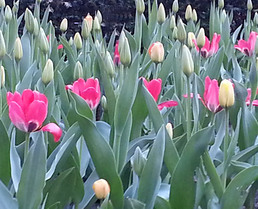 In honor of National Poetry Month, we've put ALL our poetry titles on sale at 20% off. The sale applies only to orders placed directly through our online store (no Amazon orders, sorry); at check-out, please enter code Q6C5Z6HY and the discount will be applied. Thanks for your support of poetry, poets, and independent publishing!  Rabbi/Poet Rachel Barenblat is in Jerusalem for a family bar mitzvah, and we're delighted that she'll also be giving a poetry reading including poems from her two Phoenicia titles, 70 Faces: Torah Poems, and Waiting to Unfold. Rachel is blogging about her trip on her own blog, Velveteen Rabbi. Bethlehem blogger Vicky, a longtime reader of Rachel's blog, met up with her in the Old City and wrote about the day they spent together. Her post is fascinating reading, contains some beautiful photographs, and is a hopeful comment about the power of personal integrity and good writing that communicates across continents, cultures, and religions. Have a great trip, Rachel! photo (c) 2014 Rachel Barenblat Apple Computer thinks Jon Appleton is pretty cool, and so do we at Phoenicia! For their celebration of the Mac at 30, Apple produced a major publication on their website, featuring one person per year -- artists, designers, musicians, scientists and more -- who have used the Mac in innovative and creative ways that moved computing and culture forward.
Jon Appleton was their choice for the year 1985. Here's what they said: "Pioneering Electronic Music: Electro-acoustic composer Jon Appleton established one of the first digital music studios in the world, and it was built completely around the Macintosh. With his Appletones software, he developed a revolutionary new way to teach the principles of composition to his students, inspiring musicians for years to come. Phoenicia congratulates Jon on this well-deserved recognition. Check out his electro-acoustic music at Amazon and iTunes, and his more recent classical compositions here at Phoenicia! "a beautiful addition to piano literature"Steve Reich, a pioneer of minimalism and one of America's best-known composers of contemporary music composers, recently called Jon Appleton's new compositions "a beautiful addition to piano literature." After hearing the newly released CD, Reich said he was particularly drawn to Appleton's reworking of Couperin's 'Les Bergeries'/The Sheepfolds. Noting that J.S. Bach also included that short work of Couperin's in his Anna Magdalena Bach Notebook, Reich mentioned the tradition of modern composers reworking Baroque pieces. He appreciated Appleton's sensitive reworking of Couperin's beautiful, haunting melodies. Reich and Appleton have known each other for a number of decades; both were well-known early innovators and advocates of electro-acoustic music. 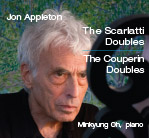 The Scarlatti Doubles/The Couperin Doubles Audio CD, 53 minutes Complete description, Ordering Information, and special offer |
NewsThe latest news and commentary about our plans, events, authors, and titles! |

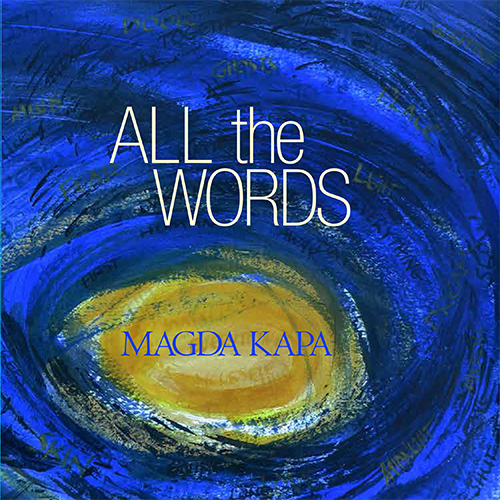

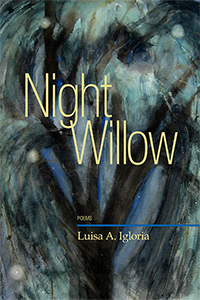

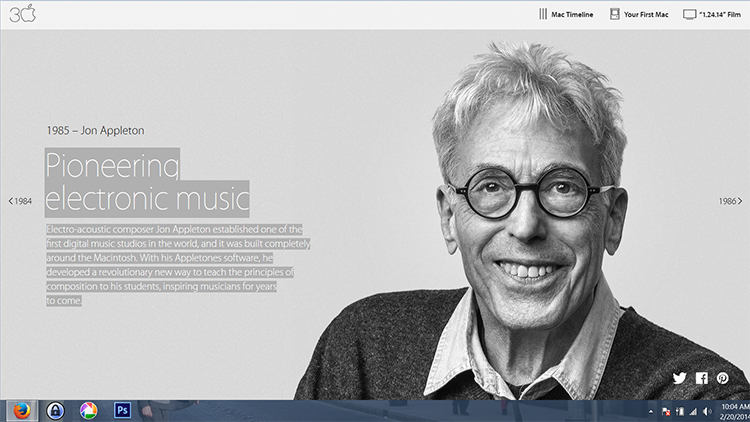
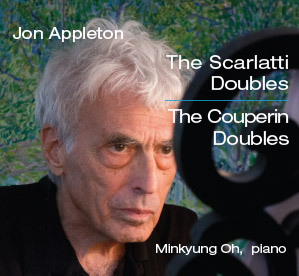
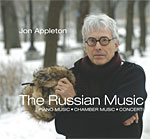
 RSS Feed
RSS Feed